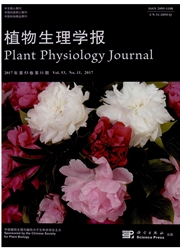

 中文摘要:
中文摘要:
由于大气污染物SO2在生理pH的水中主要形成HSO3-,因此人们就NaHSO3在藻类光合生理中的功能角色进行了广泛研究。研究结果发现,低浓度NaHSO3处理可增加围绕光系统I的环式电子传递,优化ATP/NADPH比例和改善光合碳同化;中浓度NaHSO3处理可与超氧阴离子反应,建立厌氧环境,激活氢化酶和促进光合放氢;高浓度NaHSO3处理则抑制了上述光合生理现象。本文主要围绕NaHSO3在藻类光合生理中的浓度效应进行简要综述。
 英文摘要:
英文摘要:
Under physiological pH conditions, bisulfite is a main type after the atmospheric pollutant SO2 dis- solves in water. Consequently, the functional role of NaHSO3 on algal photosynthetic physiology has been ex- tensively studied. Recent experimental results showed that NaHSO3 in a low amount improved photosynthetic efficiency via increasing cyclic electron transport around photosystem I and optimizing the ratio of ATP to NA- DPH; in a moderate amount could enhance the yield of H2 photoproduction by the reaction of bisulfite with su- peroxide anion produced at the acceptor side ofphotosystem I, and consequently building an anaerobic environ- ment and activating hydrogenase; and in a high amount suppressed the aforementioned photosynthetic reactions, including photosynthetic CO2 assimilation and HE photoproduction. This mini-review describes main- ly the concentration effect of NaHSO3 on algal photosynthetic physiology.
 同期刊论文项目
同期刊论文项目
 同项目期刊论文
同项目期刊论文
 期刊信息
期刊信息
